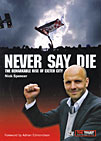 The Remarkable Rise of Exeter City
The Remarkable Rise of Exeter City
by Nick Spencer
Nick Spencer, £12.50
Reviewed by Howard Pattison
From WSC 278 April 2010
According to this book, supporters of Exeter City bought their football club in a jewellery shop. It is to be supposed that they left the premises, like so many other customers, wondering to themselves what on earth they had just done. But in 2003 the circumstances were so dire that the Trust felt they had no option but to run the club themselves.
They had just been relegated from the Football League, were suffocating with debt and had been swindled by owners who would later be convicted of their offences. Things were only likely to get worse before they got better and entering a CVA mingled the shame of being unable to settle their bills with the brinkmanship of taking the Conference to court for prejudicial treatment. And still somehow it all went right – a famous FA Cup tie with Manchester United filled the coffers and they enjoyed two trips to Wembley before gaining successive promotions.
Nick Spencer's book is a lively romp through interesting times. Slim, glossy and generously decorated with striking colour photography, it is an attractive volume; but it is clearly not intended to be a thorough investigation of the calamitous events that took the club to the edge of destruction. To be fair to the author, there probably aren't very many records that would assist his research. It isn't even possible to consult a reliable list of club shareholders since the police confiscated the register during their own investigations. However, there is a tantalising taste of anecdotal evidence and this reader would have liked some more.
Where the book scores heavily is in its depiction of the club's evolving culture. Ex-chairman David Treharne asserts that the organisational model that has served them so well in the past cannot be expected to provide for their future, while team manager Paul Tisdale's memories of a day out at Wembley are troubled by the realisation that the same team cannot possibly be expected to do it again. These are eloquent insights into the problems that lie with success. The club's commitment to continual change, both on the training ground and in the boardroom, is astute, dynamic and brave.
Tisdale is a deeply reflective man – "I find it very hard to think when I'm screaming and shouting" is his response to the accusation that he lacks passion – often espousing methods and ideas that are as much to do with resource management as they are with football coaching. Yet, even in the face of his obvious contribution to the team's progress, you're more impressed by the fact that the club chose to appoint him in the first place. The presence of such a young, enlightened manager at precisely this time in Exeter City's history is more than just chance.
Fans of the club will find much pleasure in the book and need not hesitate to invest, especially as the Trust directly benefits from sales. But it's also a story that deserves a more rigorous treatment and it is to be hoped that the author one day returns to his subject.
Howard's review is spot on.
This is an excellent book – however I would've preferred a slightly wider range of interviewees. It relies perhaps a bit too much on the views of a few (albeit influential) persons, especially in the early chapters of the book.